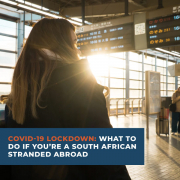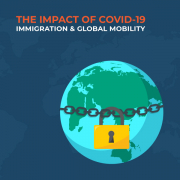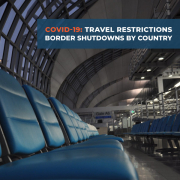Countries around the world are increasingly adopting sweeping measures to stem the spread of the new coronavirus, including full lockdowns, shutting down airports, imposing travel restrictions and completely sealing their borders.
The outbreak of the coronavirus has been labelled a pandemic by the World Health Organization (WHO).
Below is a list of countries that have taken such measures in recent days. Travellers should visit government websites for updated information and more details.
Albania
Albania’s government decided to halt passenger transport from all neighbouring countries, including flights to Italy.
On March 16, authorities also suspended all flights to the UK until further notice, the country’s ministry of infrastructure said.
On March 22, Albania suspended all commercial flights to and from the country, allowing only flag carrier Air Albania to fly to Turkey and operate humanitarian flights.
Algeria
The government said it would suspend air and sea travel with Europe from March 19. Authorities had previously halted flights with Morocco, Spain, France and China.
Angola
Angola closed air, land and sea borders.
Antigua and Barbuda
According to a March 12 travel advisory published on the Antigua Barbuda Tourism Authority’s website, foreign nationals who have travelled to China, Italy, Iran, Japan, South Korea and Singapore in the previous 28 days will not be allowed to enter the country.
Diplomats were exempted. Any cruise ship with suspected cases may also be blocked from docking.
Argentina
Argentina announced on March 15 that it would close its borders to all non-residents for at least two weeks, and all flights from the United States and Europe would be cancelled starting March 16.
Armenia
Armenia closes all malls and shops, except for grocery stores from March 22.
Australia
Australian Prime Minister Scott Morrison said on March 19 that the country’s borders would close to all visitors, except for citizens and permanent residents and their close family members.
Morrison declared a “human biosecurity emergency” on March 18 and said the country’s citizens should abandon all overseas travel.
“We are upgrading the travel ban on Australians to level four for the entire world. That is the first time that has ever happened in Australia’s history,” he said, adding it is “an indefinite ban”.
On March 15, Morrison had said international travellers arriving in the country would need to isolate themselves for 14 days, and foreign cruise ships would be banned for 30 days.
Austria
Foreign travellers from outside the Schengen area are prohibited from entering Austria until further notice.
EU citizens and foreigners who are entitled to enter are obliged to do a 14-day self-monitored home quarantine immediately after entering the country by air.
With few exceptions, much of the country’s land borders with Hungary, the Czech Republic, Germany, Switzerland and Italy are blocked.
Bahrain
Bahrain announced a reduction in the number of incoming flights until further notice, starting on March 18.
The country also suspended the visa on-arrival scheme.
Bangladesh
Bangladesh suspended flights to all European destinations except the United Kingdom. The flight ban came into effect on March 16 and will remain in place until March 31.
Belize
Belize has closed most of its ports of entry, but its Santa Elena Border and Philip Goldson International Airport remain open, according to the country’s Ministry of Health. Cargo vessels may continue to use all ports of entry.
Bolivia
Starting from March 18, Bolivia banned travel from Europe’s Schengen zone, the UK, Ireland and Iran. Previously, it had barred travellers from Spain, China, South Korea and Italy. The country has also implemented strict border measures, including medical screenings.
The measures will remain in place until March 31, the government said.
Brazil
Brazil decided on March 19 to restrict the entry of foreign visitors at land borders with Argentina, Paraguay, Bolivia, Peru, Colombia, Suriname and French Guiana, following a similar restriction at the Venezuelan border.
The restriction will last for 15 days and will not apply to foreigners with permanent residence in Brazil, diplomats and international agency officials, as well as trucks transporting goods, the presidential chief of staff’s office said.
Hundreds of Venezuelan migrants and refugees cross the Venezuela-Brazil border daily.
Bulgaria
Turkey’s land border with Bulgaria has been closed to the entry and exit of passengers, state broadcaster TRT Haber said on Wednesday.
A TRT reporter said the gates were still open for logistics.
On March 15, Bulgaria’s Ministry of Transport said it would ban incoming flights from Italy and Spain as of midnight (22:00 GMT) on March 17. Rosen Jeliazkov also said Bulgarians who wanted to return home from these countries would have March 16 and 17 to do so and would face a 14-day quarantine.
Cambodia
Foreigners travelling from Italy, Germany, Spain, France, Iran and the US were banned from entering Cambodia from March 17.
Cameroon
On March 17, the government said it shut down land, air and sea borders indefinitely, starting from March 18. International flights were grounded except for cargo planes.
Canada
On March 16, Canada announced it was closing its borders and denying entry to anyone who is not a Canadian citizen or permanent resident, except for immediate family members of Canadian citizens, aeroplane crew members, diplomats and US citizens.
On March 18, the US and Canada said they were closing their border to all non-essential traffic. Trade is not affected, the countries’ leaders said.
Most international flights to Canada will be directed through four airports from March 18. Domestic flights and those arriving from the Caribbean, Saint Pierre and Miquelon, Mexico and the US will be exempted.
Chile
Chile announced that it will shut its borders to non-resident foreigners starting March 18 for an undetermined period. Any citizen returning from high-risk areas must quarantine for 14 days.
China
China announced on March 24 that a lockdown would be lifted on more than 50 million people in central Hubei province where the coronavirus first emerged late last year.
Hubei province ordered a shutdown in January but has been gradually easing the rules and permitting people to move about within Hubei and return to work.
People who wish to travel in or out of Hubei or Wuhan will be able to as long as they have a “green” health code issued by authorities.
In January, China stepped up measures to deal with cases from overseas, with Beijing and other regions forcing international arrivals to go into a 14-day quarantine.
The civil aviation ministry also limited passenger numbers on inbound international flights.
Colombia
Colombia announced that starting on March 16 all land, air and sea borders will remain shut until May 30. This includes its border with Venezuela where thousands of migrants and refugees cross daily.
Colombia will also halt domestic flights from March 25.
Congo (Republic)
The Republic of the Congo has closed its borders.
Costa Rica
After declaring a state of emergency, Costa Rica announced it would close all borders to foreigners starting on March 18.
Croatia
On March 12, the Croatian government announced a series of restrictions on international border crossings. Foreign arrivals from hard-hit countries, such as Italy and China, are required to spend 14 days in quarantine facilities.
Authorities also implemented health monitoring for passengers from many countries affected by the virus, including Spain, the US and Sweden. Travellers from these countries should self-isolate for two weeks.
Cyprus
On March 13, Nicos Anastasiades, president of the Republic of Cyprus, said the country will shut its borders for 15 days to all but Cypriots, Europeans working on the island and people with special permits.
The measure would come into effect from March 15, he said in a state address.
Czech Republic
The Czech prime minister said on March 12 the country would close its borders to travellers from Germany and Austria and ban the entry of foreigners from other high-risk countries.
Czechs were prohibited from travelling to those countries, and to and from other countries deemed risky, effective from Saturday (23:00 GMT on Friday).
The full list includes other European Union members Italy, Sweden, France, the Netherlands, Belgium, Spain and Denmark, as well as the UK, Switzerland, Norway, China, South Korea and Iran. International public transport vehicles with more than nine seats will also be banned from crossing borders.
Denmark
On March 13, Denmark said it would temporarily close its borders to non-citizens.
“All tourists, all travel, all vacations and all foreigners who cannot prove a creditable purpose of entering Denmark, will be denied entrance at the Danish border,” Prime Minister Mette Frederiksen said. The closure would not apply to the transport of goods, including foods, medicine and industrial supplies.
Dominican Republic
The government said on March 14 that on March 16 it would suspend all flights from Europe and the arrival of all cruise ships for a month.
Djibouti
On March 15, Djibouti said it was suspending all international flights.
Ecuador
From March 16, borders were completely closed, including to citizens and residents, for 21 days.
Ethiopia
On March 20, the Ethiopian government announced that its state-carrier, the African continent’s biggest airline, would suspend flights to 30 countries.
From March 23, all arriving passengers face mandatory quarantine. Ethiopia also announced that it would shut its land borders to nearly all human traffic as part of efforts to curb the spread of the coronavirus.
Egypt
Egypt will suspend all air traffic at its airports from March 19 until March 31, Prime Minister Mostafa Madbouly said on March 16.
El Salvador
El Salvador shut down its airport on March 16 to all commercial flights. On March 11, it had banned entry to all foreigners, excluding accredited diplomats and legal residents of the country. Those allowed to enter were subject to a possible 30-day quarantine.
Finland
On March 17, Interior Minister Maria Ohisalo said Finland would start heavily restricting traffic over its borders on March 19.
France
French President Emmanuel Macron announced on March 16 that France’s borders would be closed from March 17.
The French leader, however, added that the country’s citizens would be allowed to return home.
The EU’s external borders were also shut for 30 days from March 17. This does not apply to US citizens departing France to return to the United States.
Flights from China, Hong Kong, Macao, Singapore, South Korea, Iran, and affected regions in Italy arriving at Charles de Gaulle airport in Paris are met by medical professionals to answer questions and take into care any person presenting symptoms.
Gambia
The Gambia decided on March 23 to close its borders with neighbouring Senegal for 21 days as part of measures to stem the spread of the coronavirus, local media reported on Monday.
Georgia
The Caucasus republic imposed a ban on all foreign citizens entering the country and closed its borders. Georgia also halted air traffic with other countries on March 20.
Germany
On March 15, Germany said it would temporarily introduce border controls on its frontiers with Austria, Switzerland, France, Luxembourg and Denmark from March 16.
The entry restrictions were expanded to include flights from Italy, Spain, Austria, France, Luxembourg, Denmark and Switzerland, the interior ministry said on March 18. The new entry restrictions also apply to sea transport from Denmark, an interior ministry spokesman said.
Ghana
Starting on March 17, Ghana banned entry to anyone who has been to a country with more than 200 coronavirus cases in the previous 14 days, unless they were official residents or Ghanaian nationals.
The country closed all borders from March 22 and ordered a mandatory quarantine for anyone who entered the country before midnight that day.
Greece
Greece on March 14 banned all flights that were still operating to and from Italy until March 29.
On March 15, it had said it would ban road and sea routes, as well as flights to Albania and North Macedonia, and ban flights to and from Spain to stem the spread of the coronavirus. Only cargo and citizens who live in Greece will be allowed to travel to and from Albania and North Macedonia, authorities said.
Athens also extended travel restrictions to Italy, saying it was banning passenger ship routes to and from the neighbouring country, while no cruise ships would be allowed to dock at Greek ports. Greece said it would put anyone arriving from abroad in quarantine for two weeks.
Turkey’s land borders with Greece have been closed to entry and exit of passengers as a measure against the coronavirus outbreak, state broadcaster TRT Haber said on Wednesday.
A TRT reporter said the gates were still open for logistics.
On March 23, Greece suspended flights from Britain and Turkey to curb the spread of coronavirus, as a lockdown took effect in the country.
Grenada
All arriving travellers who have visited Hong Kong, China, South Korea, Japan, Singapore, Iran, Italy or Germany in the last two weeks will be subject to quarantine, the Miami Herald reported on March 17.
Guatemala
Guatemala banned all non-resident arrivals and suspended all flights from March 16 to 30 except for cargo. It also banned cruise ships from docking. On March 17, the country also announced it was suspending all deportation flights from the US.
Guyana
Starting on March 18, all airports were partially closed for 14 days. The closure mainly affects international passenger flights, local media reported.
Haiti
On March 19, Haiti’s government declared a state of emergency over the coronavirus outbreak, closing the borders of the nation and imposing a curfew after authorities detected the first two cases of infection.
It has also suspended all international flights, except for those coming from the US, and it closed its border with the Dominican Republic.
Honduras
Honduras has ordered all borders closed except for cargo.
Hungary
Hungary will close its borders for international passengers, Prime Minister Viktor Orban told Parliament on March 16.
India
On March 18, India said it would suspend the vast majority of visas to the country. Millions of foreign nationals of Indian origin, who are traditionally granted visa-free access, will now also need to apply.
The advisory said anyone with a “compelling reason” to travel to the country could contact their nearest Indian mission. It also urged Indian nationals to avoid all non-essential travel abroad.
On March 17, India had suspended issuing visas to citizens of France, Spain and Germany until further notice. Such restrictions were already in place for citizens of China, Italy, Iran, Japan and South Korea – the five countries worst hit by the outbreak.
National airline Air India said on Wednesday it was suspending flights to Italy and South Korea until March 28 and March 25, respectively. India has also closed a border with neighbouring Myanmar.
On March 22, India’s one-week ban on all international flights came into effect.
Iraq
Iraq suspended flights at its domestic airports from March 17 to 24. On March 15, Iraq suspended all flights to and from Baghdad International Airport over the same period.
Italy
In Italy, government officials placed the country of 60 million people on lockdown on March 10 in an attempt to stop the spread of the virus. The restrictions will run until April 3.
People flying into Italy are subject to temperature screening at Italy’s major airports, and the country has suspended flights from China and Taiwan.
Italy also banned domestic travel and shut down a range of industries on March 23 in a last-ditch push against the spread of a coronavirus.
Jamaica
Jamaica has imposed travel restrictions on travellers from Iran, China, South Korea, Italy, Singapore, Germany, Spain, France and the UK, local media reported. The government also said anyone arriving from countries where there is community spread will be required to self-quarantine for 14 days.
Japan
The country imposed an entry ban to travellers who have been in China, Iran or Italy in the 14 days before arrival.
Jordan
Jordan on March 17 closed border crossings with Israel and the Israeli-occupied West Bank and its sea ports to shipping from Egypt. It also barred overland passenger traffic from Iraq.
The government banned travel to Lebanon and Syria and also barred entry to travellers from France, Germany and Spain. The measures included reducing airline service by half to Egypt.
Kazakhstan
President Kassym-Jomart Tokayev on March 15 declared a state of emergency, barring entry to the country for everyone except returning citizens, diplomats and those invited by the government. Kazakhs are also barred from leaving the country.
Kenya
Kenya suspended travel from any country with reported COVID-19 cases.
“Only Kenyan citizens and any foreigners with valid residence permits will be allowed to come in, provided they proceed on self-quarantine,” President Uhuru Kenyatta said.
Kuwait
Authorities banned all commercial passenger flights to and from Kuwait.
Kyrgyzstan
Kyrgyzstan on March 17 said it would ban entry to all foreigners.
Latvia
Latvia stopped nearly all foreigners from entering the country, with all international travel, by air, rail, sea and road cancelled. Latvians and foreigners with residency rights in Latvia can enter the country.
Lebanon
The Lebanese government on March 11 announced the suspension of flights from Italy, Iran, China and South Korea.
On March 12, the Lebanese government decided to close indefinitely all land border crossings into Syria.
Libya
Libya’s UN-recognised Government of National Accord (GNA) in Tripoli suspended all flights at the Misrata Airport for three weeks. Borders have also been closed.
Lithuania
Lithuania on March 16 shut its borders to nearly all foreigners. Lithuanian citizens were also banned from leaving the country, except for business trips.
The ban, which has exceptions for truck drivers, diplomats and people passing through the country on their way home, will be in force until March 30.
Madagascar
Starting from March 20, there will be no commercial passenger flights to and from Europe for 30 days. Travellers arriving from affected countries must self-quarantine for 14 days.
Malaysia
Malaysia shut its borders to travellers and restricted internal movement from March 16 until March 31.
Maldives
The government banned entry to travellers from China, Italy, Bangladesh, Iran, Malaysia and the UK, as well as to those coming from specific regions in Germany, France and South Korea.
All direct flights to China, South Korea and Italy have also been suspended.
Mali
Mali will indefinitely suspend flights from countries affected by the virus starting on March 19, except for cargo flights.
Mexico
On March 20, the US and Mexico agreed to restrict non-essential travel over their shared border, US Secretary of State Mike Pompeo said, placing limitations on one of the world’s busiest borders.
The restrictions will be reviewed after 30 days, Pompeo said at a White House news briefing.
Moldova
Moldova temporarily shut its borders and suspended all international flights from March 17.
Morocco
On March 14, Morocco said it would halt flights to and from 25 countries, extending an earlier ban that covered China, Spain, Italy, France and Algeria.
The countries affected are Austria, Bahrain, Belgium, Brazil, Canada, Chad, Denmark, Egypt, Germany, Greece, Jordan, Lebanon, Mali, Mauritania, the Netherlands, Niger, Norway, Oman, Portugal, Senegal, Switzerland, Sweden, Tunisia, Turkey and the UAE.
Nepal
As of March 14, all foreign nationals who enter Nepal must remain in self-quarantine for 14 days, according to the country’s Department of Immigration.
Nepali nationals and residents must stay in home quarantine for 14 days from their arrival date. All these measures are in place until April 30.
The country has stopped issuing on-arrival visas to foreigners from March 14 through April 30.
Netherlands
The Dutch government announced that entry restrictions will be tightened for non-EU citizens who wish to travel to the Netherlands starting from March 19.
The travel restrictions do not apply to EU citizens (including citizens of the United Kingdom) and their family members, as well as citizens from Norway, Iceland, Switzerland, Lichtenstein and their family members.
New Zealand
From March 19, New Zealand will close its borders to all non-citizens or non-permanent residents.
Prime Minister Jacinda Ardern said on March 15 everyone arriving in New Zealand will require to self-isolate for 14 days, excluding people from the Pacific Islands.
Nigeria
On March 18, the government announced it was restricting entry into the country for travellers from China, Italy, Iran, South Korea, Spain, Japan, France, Germany, the US, Norway, the UK, Switzerland and the Netherlands. Those coming from high-risk countries are asked to self-isolate for 14 days.
Nigeria expanded its restrictions on March 21 announcing it will close its two main international airports in the cities of Lagos and Abuja from March 23 for one month.
The country also plans to suspend rail services starting on March 23.
Norway
On March 14, Norway said it would shut its ports and airports from March 16, although exemptions will be made for Norwegians returning from abroad as well as for goods.
The country also said it will implement extensive controls of its land entry points, but will not shut its 1,630km (1,000-mile) border with neighbouring Sweden.
Oman
Oman suspended tourist visas from all countries and banned cruise ships from docking. From March 18, it enforced an entry ban on all non-Omanis, including expatriates with residency visas.
Pakistan
On March 21 the country suspended all international flights until April 4. The move came as the country had already shut all its land borders a week before.
“It has been decided that all borders will remain closed for 15 days,” Foreign Minister Shah Mehmood Qureshi told the local ARY and Dunya TV networks. “International flights will operate only out of Karachi, Lahore and Islamabad airports.”
Panama
On March 16, the government announced that only Panamanians and foreign residents would be allowed to enter the country. On March 22, the country banned all international flights and on March 25 Panama suspended all domestic passenger flights from both local and international airports.
Paraguay
On March 14, Paraguay suspended flights from Europe until at least March 26. It has also restricted traffic across Friendship Bridge, which connects the country with Brazil, to authorised cargo traffic.
Peru
After declaring a state of emergency on March 15, Peru announced it would shut down its border for at least 15 days starting on March 16. The measure includes the cancellation of all commercial international flights into the country.
Philippines
A month-long lockdown on Luzon – the largest Philippine island home to nearly 60 million people – is in place, while domestic and international flights have been cancelled until April 14.
Poland
On March 13, Poland said it would ban foreigners from entering the country from March 15 and impose a 14-day quarantine on its citizens returning home. Those with a residence permit in Poland would also be allowed to enter, Prime Minister Mateusz Morawiecki said.
No international inbound flights or trains would be allowed from March 15, except for some charter flights bringing Poles back from holidays.
Portugal
Flights from outside the EU are suspended, excluding the UK, USA, Canada, Venezuela, South Africa and Portuguese speaking countries.
Portuguese Prime Minister Antonio Costa said that travel restrictions on the land border with Spain should guarantee that free movement of goods continues and protect the rights of workers, but that “there must be a restriction (on travelling) for the purposes of tourism or leisure”.
Qatar
On March 15, Qatar said it would ban inbound flights, except for cargo and transit flights, starting from March 18. The entry ban does not apply to Qatari citizens.
Romania
Romania’s government barred most foreigners from entering the country on March 21 and tightened restrictions on movement inside the country.
“Foreign citizens and stateless persons are banned from entering Romania through all border points,” Interior Minister Marcel Vela said during a national address.
Exceptions would be allowed for those transiting through Romania using corridors to be agreed with neighbouring states, he added.
Russia
On March 14, the Russian government said it was closing the country’s land border with Poland and Norway to foreigners.
It said the closure would apply to all foreigners passing through those border points for tourism, study, work or private visits. Citizens of neighbouring Belarus and official delegations were exempt.
Rwanda
Rwanda on March 22 closed its borders completely, except for goods and cargo and returning citizens, authorities said.
Anyone arriving in Rwanda will be subject to a 14-day quarantine at designated locations.
Saint Kitts and Nevis
The Caribbean country asked anyone who has travelled to China, Italy, Iran, Hong Kong, Singapore, South Korea, Japan, the UK, France, Germany and Spain to not visit, the Miami Herald reported. If an individual does arrive from one of these countries, he or she must go through a 14-day quarantine.
Saint Lucia
Saint Lucia imposed restrictions on travellers arriving from France, Germany, Spain, the UK, China, Japan, South Korea, Italy and Singapore, according to local media.
Saudi Arabia
On March 15, Saudi Arabia suspended all international flights for two weeks.
Serbia
On March 19, Serbia closed its airport and said it would shut all road and rail borders other than to freight traffic, as well as halt all internal passenger transport, in a bid to curb the spread of coronavirus.
Passenger flights were banned from Belgrade’s Nikola Tesla Airport for the first time since 1999 when flights were halted during the NATO bombing of the country and the war in Kosovo.
The airport remains open only for humanitarian flights and planes with special permits. Serbia had already barred flights to and from the airport in the southern city of Nis.
Singapore
As of March 15, “all new visitors with recent travel history to France, Germany, Italy and Spain within the last 14 days will not be allowed entry into or transit through Singapore”, according to officials.
Singapore residents and pass-holders who have been to those countries in the past 14 days will be issued with a “Stay-Home Notice”, requiring them to quarantine for two weeks.
On March 22, the city-state barred all short-term visitors from entering Singapore, saying that from 11:59pm on Monday, the only non-nationals allowed in would be work permit holders in “essential sectors” such as healthcare.
Slovenia
Slovenia on March 11 said it was closing some border crossings with Italy and began making health checks at those remaining open. Passenger train transport between the two countries was also cancelled.
Somalia
Somalia has banned all international flights.
South Africa
South Africa barred entry to foreign travellers arriving from or transiting through high-risk countries, including Italy, Iran, South Korea, Spain, Germany, France, Switzerland, the US, the UK and China.
South Africans were also advised to cancel or postpone all non-essential foreign travel.
South African Airways announced on March 20 it would suspend international flights until May 31.
On Monday 23 March 2020 the President of South Africa, Cyril Ramaphosa has announced that there will be a nationwide shutdown for 21 days starting from 26 March 2020 midnight and results in no entry for foreign travellers until 16 April 2020.
South Korea
On March 17, South Korea said it would tighten border checks for all overseas arrivals. The government had already imposed strict border checks on visitors from China, Italy and Iran, requiring them to sign up by a smartphone application to track whether they have any symptoms, such as fever.
The government also issued a “special travel advisory” on March 23, calling on its citizens to cancel or postpone their trips abroad over the spread of the new coronavirus.
The Foreign Ministry said that the special travel advisory applies to all countries except those that are already under higher alerts that call for the withdrawal of citizens or are subject to a travel ban.
South Korea has also enforced a two-week quarantine period and virus tests for all long-term arrivals from Europe, regardless of symptoms, to contain imported virus cases.
Spain
Spain will restrict entry for most foreigners at air and sea ports for the next 30 days to help stem its coronavirus epidemic, the Interior Ministry said on March 22. The ban – starting at midnight – comes a few days after Spain imposed restrictions on its land borders with France and Portugal, after European Union leaders agreed to close the bloc’s external borders for 30 days.
Spanish nationals, foreigners living in Spain, air crew, cargo and health workers and diplomats will be allowed to travel as normal, the ministry said in its statement.
On March 16, the Spanish government announced the closing of its land borders, allowing only citizens, residents and others with special circumstances to enter the country.
Direct flights from Italy to Spain have been banned until March 25.
Sri Lanka
On March 22, the Sri Lankan government imposed an indefinite ban on all passenger flights and ships.
A government statement said all passenger flights and ships will not be allowed to enter the Indian Ocean island until the situation returns to normalcy.
Sudan
On March 16, Sudan closed all airports, ports and land crossings. Only humanitarian, commercial and technical support shipments were excluded from the restrictions.
Suriname
Suriname closed all of its land and sea borders on March 14.
Sweden
The government has temporarily stopped non-essential travel to Sweden from countries outside the EEA and Switzerland. The decision took effect on 19 March and will initially apply for 30 days.
Tajikistan
All flights are suspended starting from 20 March. Travellers who have been in or transited through, China, Iran, Italy or South Korea in the 14 days before arrival are banned from entering the country.
Trinidad and Tobago
Trinidad and Tobago closed its border to foreigners for 14 days beginning on March 17, local media reported. Nationals will be allowed to enter the country but will be subjected to quarantine.
Tunisia
Tunisia, which declared 24 cases of the virus, closed mosques, cafes and markets, closed its land borders and suspended international flights on March 16.
Tunisia also imposed a curfew from 6pm to 6am starting on March 18, Tunisia’s president said, tightening the measures to counter the spread of the coronavirus.
Turkey
Turkey’s land borders with Greece and Bulgaria have been closed to the entry and exit of passengers as a measure against the coronavirus outbreak, state broadcaster TRT Haber said on Wednesday.
A TRT reporter said the gates were still open for logistics.
The government is suspending flights to and from several countries, including Germany, France, Spain, Norway, Denmark, Austria, Sweden, Belgium, the Netherlands, Italy, China, South Korea, Iran and Iraq.
The government further expanded on March 21, its flight suspensions to another 46 countries. The decision brought the total number to 68 countries with which Turkey halted its flights.
The flight ban includes Angola, Austria, Azerbaijan, Algeria, Bangladesh, Belgium, Cameroon, Canada, Chad, Czechia, China, Colombia, Djibouti, Denmark, Dominican Republic, Ecuador, Egypt, Equatorial Guinea, Finland, France, Germany, Guatemala, Georgia, Hungary, India, Italy, Iraq, Iran, Ireland, Ivory Coast, Jordan, Kazakhstan, Kenya, Kosovo, Kuwait, Latvia, Lebanon, Montenegro, Mongolia, Morocco, Moldova, Mauritania, Nepal, Niger, Norway, the Netherlands, North Macedonia, Oman, the Philippines, Panama, Peru, Poland, Portugal, South Korea, Slovenia, Sri Lanka, Sudan, Saudi Arabia, Spain, Sweden, Switzerland, the Turkish Republic of Northern Cyprus, Taiwan, Tunisia, Uzbekistan, United Arab Emirates, the UK and Ukraine.
Turkmenistan
Turkmenistan, which has so far reported no coronavirus cases, has suspended all international flights. Authorities have made no official announcements on the scope and duration of the new restrictions.
Domestically, people travelling to and from Ashgabat were told by officials at checkpoints installed around the capital that non-essential travel was banned, according to Reuters.
Uganda
On March 18, Uganda restricted travel to some of the affected countries such as Italy.
Uganda suspended all passenger planes in and out of the country starting from March 22. Cargo planes will be exempted.
Ukraine
Ukraine said on March 13 that foreign nationals would be barred from entering the country.
United Arab Emirates
The government indefinitely suspended flights to and from Lebanon, Turkey, Syria and Iraq from March 17. On March 23, Dubai carrier Emirates announced the suspension of all passenger flights. Hours later, Abu Dhabi’s Etihad announced the suspension of all passenger services, except for some returning UAE nationals and diplomats to Abu Dhabi.
United Kingdom
The government on March 17 advised citizens “against all non-essential travel worldwide”, initially for a period of 30 days.
United States
The US has banned the entry of all foreign nationals who have travelled to China, Iran, Austria, Belgium, Czech Republic, Denmark, Estonia, Finland, France, Germany, Greece, Hungary, Iceland, Italy, Latvia, Liechtenstein, Lithuania, Luxembourg, Malta, the Netherlands, Norway, Poland, Portugal, Slovakia, Slovenia, Spain, Sweden, Switzerland, the UK or Ireland 14 days before their arrival.
US citizens or permanent residents who have visited a high-risk area must fly into one of the 13 international airports with enhanced entry screening capabilities.
On March 18, President Donald Trump announced that the US would close its northern border with Canada “by mutual consent” to non-essential traffic such as tourists and other visitors.
On March 20, the US and Mexico agreed to restrict non-essential travel over their shared border for 30 days, US Secretary of State Mike Pompeo said, a decision that will be revisited after the period.
Uruguay
On March 15, Uruguay announced it would ban all flights from Europe starting from March 20. Earlier, it had announced that passengers from China, South Korea, Japan, Singapore, Iran, Spain, Italy, France and Germany had to go through a 14-day quarantine.
Uzbekistan
Uzbekistan has barred entry for all foreigners.
On March 22, the country announced it was closing its borders for its citizens, preventing them from leaving from March 23 onwards.
Venezuela
On March 12, Venezuela announced it would cancel all flights from Europe, Colombia, Panama and the Dominican Republic for at least 30 days. The country has also announced a nationwide quarantine.
Vietnam
Vietnam announced on March 21 that it will suspend all inbound international flights to contain the spread of coronavirus in the country, without giving a time frame.
The government also announced it would bar entry for all foreigners from March 22, except for special cases.
Yemen
On March 14, the internationally-recognised government of war-torn Yemen said it would suspend all flights to and from airports under its control for two weeks starting on March 18.
A statement from the office of Prime Minister Maeen Abdulmalik Saeed said the move exempted flights for humanitarian purposes. The key airports his government controls are in Aden, Sayoun and Mukalla.
Zimbabwe
On March 24 the President of Zimbabwe Emmerson Mnangagwa announced that all borders will closed to human traffic except for returning residents.
Source: Aljazeera







